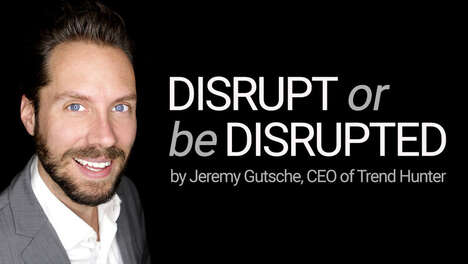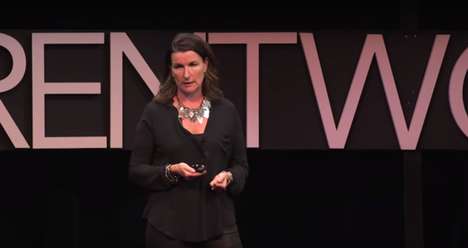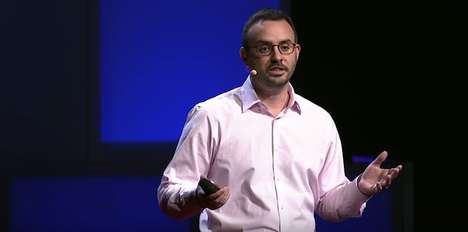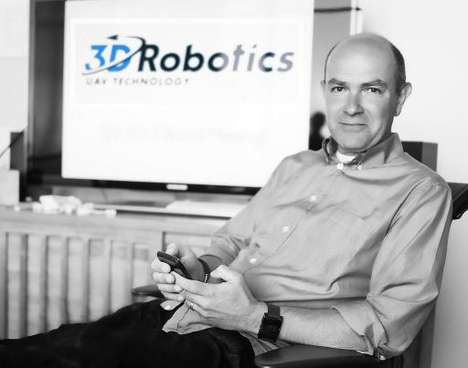Strategic Thinking and Creative Research
Gemma Vallet, Innovation Director of PHD Spain
 PHD, a global communications and media network, uses strategic thinking and in-depth research to create award-winning work for some of the largest advertisers in the world.
PHD, a global communications and media network, uses strategic thinking and in-depth research to create award-winning work for some of the largest advertisers in the world. Recently, Trend Hunter spoke with Gemma Vallet, the Innovation Director of PHD Spain.
Can you tell us a little about your role and what led you to it?
In the past, I was Head of Digital Strategy, Innovation & UX at Morillas Interactive, before REDCODE agency, and part of the management board. Before this I was responsible of digital marketing and social media for Zurich Group in Spain and for Zurich Marathon Barcelona. During almost 10 years I was creative director and online brand consultant at Capgemini Group, interactive unit. I’ve been working in Barcelona, Madrid, Dublin, Dubai, Lisbon and London. Today I am Innovation director at PHD Media Spain, and I am based at Barcelona. I really enjoy what I do here because the company has such a strong focus on the market, they’re great innovators and I found the culture to be really aligned with my values.
In PHD Media, my mission is to be an influencer, thinker and doer in the innovation field in media & communications, in order to align all the brand leaders and advertisers so that we can introduce innovative ideas and actions to evolve their communications and branding into the next level in their market, being more efficiency, providing better communication and marketing channels solutions to help brands to meet new requirements. That takes up about 90 percent of my time at PHD, but I also spend a lot of my time doing research as well. This enables me to keep up with how the market is changing and speak with others who are involving themselves with really interesting projects and campaigns.
How does your team generate great ideas? Do you have certain rituals to make creativity happen?
We have brainstorming sessions frequently and we always try to challenge people so that they’re motivated to think differently. I find that’s the best way to accelerate creative thinking. We all do our research, put ideas on the table, and then take the time to reanalyze things and refocus so that we’re always moving in the right direction.
What are some barriers to innovation? How do you get around them?
As we expand, we find ourselves working with different types of technology, such as video chat bots and interactive surfaces. We’re also focusing on analytics a lot right now, like tracking and localization. Working with new technology and platforms can sometimes be challenging, but it’s important to adapt so that you can push forward.
How do you identify trends? What resources does your team use to spot trends and insights?
Of course, one of our main resources is Trend Hunter, because we’re able to gain a lot of information by consulting with research experts. I also use my own experience in teaching at a university level, so I like to consult books that were written in the past, especially those by Alvin Toffler, Jeremy Rifkin, and other authors like them. I feel that their ideas are still very relevant today. By combining these traditional resources with our own research, and that from consultancies like Trend Hunter, we’re able to get a full understanding of the current market.
Do you have specific rituals for resetting to be creative?
I think we’re pretty standard in our rituals, we host meetings frequently and collaborative brainstorming sessions. Overall, we’re quite traditional, but we always push for creativity and test multiple ideas. PHD also uses a collaborative tool called SOURCE that we use internationally. Everyone can use it to share ideas and it also has a competitive element that entices more people to update it. For example, at the end of the year, a person who’s put forth a lot of creative or innovative ideas can win a trip to the Cannes Festival of Creativity. I think this tool is very impressive because it functions as a useful platform that drives collaboration and it is also motivating.
Has there ever been an instance where another industry has influenced an innovation at your company?
For sure. Personally, I’m always looking at the fashion and auto industry. The latter because it’s one of our main customers and it’s one of the most innovative industries in general, as it’s always changing in really impressive ways. I’m always looking at fashion because they have to reinvent themselves every two months just to keep up with changes in seasons and trends. Due to this, they’re one of the most innovative industries because they have to constantly adapt and become more creative to stay relevant.
What are some examples of things you can do to create a culture of innovation?
I think there are many different ways to do this, one way is to implement a reward system like that which PHD uses. I think that creating healthy competition is a great way to motivate people so that a culture of innovation is present. Another way is to set up learning experiences, such as attending conferences or even just speaking with new people frequently. It’s also important to think economically when it comes to this, because being able to give a numerical value to a product ensures that it’s considered more seriously.
What do you think your industry will look like in 10 years?
There’s a lot that’s going to change and I think that we are just at the beginning. I can see the industry showing similarities to companies like Google or Netflix in the future, or even the auto industry. With cars, we’ve seen them become driverless and so much more in just a short amount of time. I think the media and advertising industry will follow in a similar sense, in that there will be pivotal changes in the next five years which will totally transform how things are done.
How does your company approach Millennial and the Generation Z demographics?
Being a media company, we find it’s highly important to use current data and intelligence that allows us to properly know how we should consider specific demographics.
What’s the importance to you of involving your employees in local businesses or local experiences?
I think it’s mandatory to do this in creative industries because actually having the chance to go somewhere and experience it yourself allows you to really understand it. Just in Spain, there are huge behavioral differences on a regional basis and you can learn a lot by exploring these different areas and taking a very specific focus.
References: phdmedia
Featured Articles

Future Festival Keynote (2,500,000 views!)
Innovation Keynote Speaker Jeremy Gutsche

Short-Term Employment Attitudes
Therese Hayes's Talk About Career Paths Discusses Changing Jobs

Nurturing Entrepreneurial Minds
Shoel Perelman's Talk About Startup Mentality is on Individuals

Supporting Open Innovation
Chris Anderson's Talk on Technology Narrates the Success of His Company

The Realization of Ideas
Michael Siegmund's Talk About Innovation is on Personality Differences

Annie Ho, Trend Hunter (INTERVIEW)
Annie Discusses the Comic 22 Batman Characters in 40 Seconds

Quality Over Quantity (INTERVIEW)
Mark Molnar, Founder of Lifestyle Website MASHKULTURE